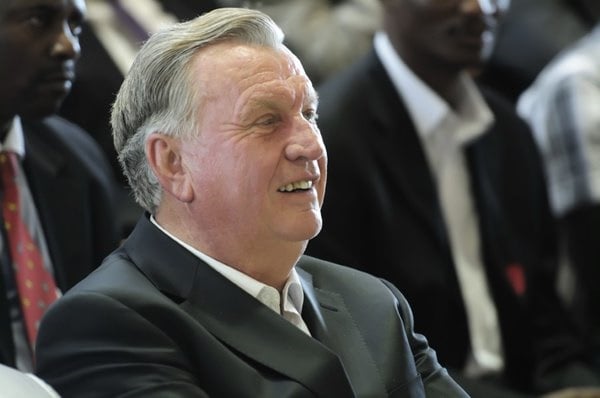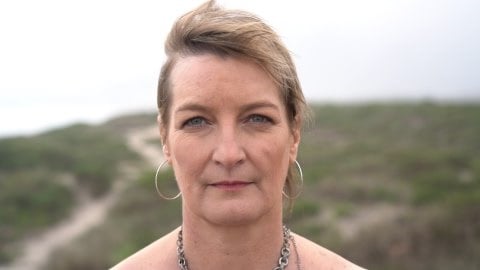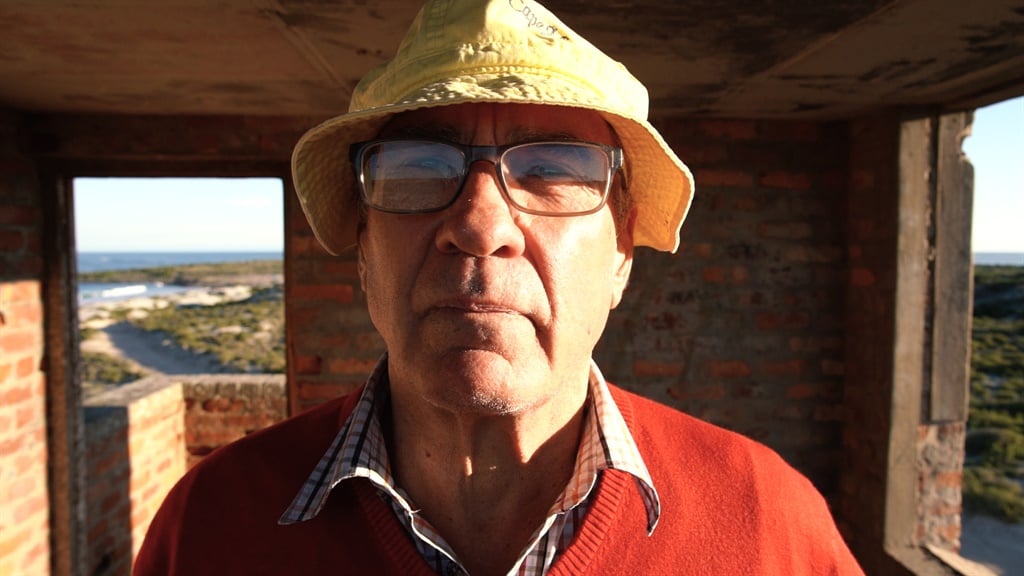This story is part of a seven-month News24 investigation into accusations of gross human rights violations, alleged money laundering and turning a blind eye to sexual abuse. To read and watch our full series, click here: Exodus | Uncovering a cult in KwaZulu-Natal
A 50-year old Christian mission in KwaZulu-Natal stands accused of gross violations of human rights, turning a blind eye to sexual abuse, and alleged money laundering spanning four decades.
After an investigation of seven months, News24 can today reveal the depth of the rot at KwaSizabantu (KSB), one of the biggest missions in Africa started by German preacher Erlo Stegen in 1970 at Kranskop, northern KwaZulu-Natal.
EXODUS | Uncovering a cult in KwaZulu-Natal
The mission has since morphed into a multibillion-rand money-making machine, owning the popular aQuellé sparkling water plant and supplying fruit and vegetables to Woolworths, Spar, Checkers and Shoprite.
Under apartheid, KwaSizabantu leadership monitored the families of ANC activists and provided information to the National Party’s Security Branch and Military Intelligence.
This according to former apartheid-era agent and former member Koos Greeff, who told News24 how he had to “keep an eye” on the mother of former president Jacob Zuma, who had attended some KSB church meetings.
After ANC operatives were identified, they were “removed”.
Many years later, Zuma would appear as a guest of honour at the 90th birthday celebration of Stegen, alongside IFP leader Mangosuthu Buthelezi.
- News24 has in its possession sworn affidavits by six women who claim they were either raped, sexually abused, molested or assaulted by men affiliated to KwaSizabantu since the 1980s. Some of them were children, as young as five years old, when the abuse happened;
- The Hawks have confirmed that an investigation into allegations of money laundering of almost R150 million is underway after former KSB members blew the whistle and spoke out about the movement of cash under dubious circumstances to an associate of Lidia Duba, Stegen’s unofficial deputy and protégé;
- One of the men named as a perpetrator of alleged sexual abuse is Muzi Kunene, an IT specialist who was also accused of assisting the National Intelligence Agency (NIA) with fabricating the so-called “hoax emails” that purported to prove a political conspiracy against Zuma before the ANC’s 2007 Polokwane conference, before his acquittal in 2009. Kunene is currently serving jail time for murder.
Many of the former members of KSB described the mission as a “cult”, where Christianity is “abused” to rule through fear, and congregants are continuously forced to repent their sins, while alleged rapists and criminals walk free.
DOCUMENTARY | EXODUS: Uncovering a cult in KwaZulu-Natal
Stegen, Dube and a group of elderly women called “the Mamas” are alleged to be the rulers at KSB.
KSB has denied the allegations made against them and called News24’s investigation a “smear campaign“.

Reverend Erlo Stegen.
Rape, virginity testing and indoctrination
Amanda*, 30, a former teacher at KSB, is one of the rape survivors who gave her affidavit to News24. She claims that she was held against her will in 2019 and raped and sexually assaulted with a pipe to give her a “spiritual hiding“.
Her sin? Wanting to leave the mission.
The woman said she was accused of being a Satanist after being seen in the “spiritual realm”. She was also allegedly told that a spirit of “breaking up marriages” was possessing her, she told News24.
Amanda claimed she was locked in KwaSizabantu’s hospital, where her attacker, a fellow teacher, had raped her before dressing her and reading to her from the Bible – Ezekiel 16:6: “I saw you wallowing in your blood and I said to you, live!”
She reported her ordeal to the police.
Nelda*, now a doctor in the Western Cape, alleges she was only five-years old when she was raped by another member of the mission in the late 1980s. Ten years later, she opened up to her parents, who reported it to KwaSizabantu’s leadership.
Despite her attacker admitting what he had done, she knows of no repercussions for him.
PODCAST | EXODUS Chapter 1: The Mission
This, however, didn’t surprise her – she claimed KwaSizabantu was a patriarchal community where sexual abuse of minors was not uncommon.
Celimpilo Malinga recounted being made to lie on her back as a group of women performed virginity testing on her as a young girl.
She was 15 when she was kicked out of KwaSizabantu after being falsely accused of having a relationship with a man who had been seen giving her a chocolate ball. Left to fend for herself, she believes her excommunication robbed her of a meaningful relationship with her family who had been expected to turn their backs on her.
She charged that, despite being integrated, black and white children were not treated equally.
Chantal Engelbrecht, Stegen’s niece, says she had not yet turned 16 when she was raped by a distant relative in the sugarcane field on the family farm. When she told her uncle, he allegedly called her a whore and a prostitute, instructing her not to tell anyone of what had happened to her.
Over 30 years later, in 2019, she laid a charge of rape against her alleged attacker.
EXODUS | What is KwaSizabantu Mission?
She has since left the mission and married her husband, David, who was excommunicated after his request to marry her was denied by the mission.
Erika Bornman said the mission introduced terror into her life, saying that as a little girl living at KwaSizabantu, fear became her constant companion as children were punished for the slightest misstep.
She claimed that among the teachings were that men were superior to women, who were decried as temptresses and the root of all wrongdoing.
Children received no sex education, Bornman said, and she was left confused when her counsellor – Muzi Kunene – had allegedly started fondling her.
Kunene denies the abuse.

Erika Bornman.
Bornman, too, claimed to have been called a “whore, slut and Delilah” when she reported to Stegen what had happened. When she eventually left KwaSizabantu, Stegen put “God’s curse” on her life.
Marietjie Bothma said she had grown up in a physically and sexually abusive home at the mission and that the KwaSizabantu leadership had failed to intervene despite knowing what was happening in the church quarters her family lived in.
She and her family had lived in the Stegen home when they arrived from Pretoria. She claimed that he had beaten her often, claiming to once have been undressed and hit with a piece of leather for stealing custard meant for visitors.
She was later excommunicated after attempting suicide and ended living on the streets of Johannesburg.
Threatened with a butcher’s knife
Pieter Becker, a once committed member of the mission since 1980, left KSB in 2013.
Only seven years old when he joined KwaSizabantu with his parents, he said for most of his life he had been devoted “heart and soul” to Stegen’s teachings. When, as an adult, he moved to northern KwaZulu-Natal for work, he preached and established a KwaSizabantu branch in the area.
But the mission divided his family, he said, forcing him to turn his back on his family members who had left the mission as they didn’t agree with its teachings.
He lived a life of fear, Becker said, afraid of breaking any of the umpteen rules which could result in his excommunication.
He recalled an incident where his young sibling had been caught stealing toffees and was publicly humiliated. A butcher knife was fetched, and she was threatened that her arm would be cut off, Becker claimed.
“They don’t believe in salvation by grace through faith. They teach perfection by keeping man-made rules, while even the leaders are far from perfect, deceiving to hide their imperfection,” he said.
The teachings of the Bible are twisted to suit agendas, Becker believed, and those who dared defy or question what they were told were banished and ostracised.
“Once the light dawned on me, I apologised in a letter to Erlo Stegen, saying I had to leave.”
Part of his letter reads: “While God has been working in our lives, He has, however, also very clearly shown us that He is calling us away from KwaSizabantu Mission. This is a very difficult step to take, but because we truly want to obey God with all our hearts, we have finally come to the point of taking that step.”
‘Cheap labour’ and big bucks
KwaSizabantu has no shortage of money, financing itself through various projects and donations, Stegen had said 20 years ago.
Apart from the aQuellé water plant and fruit and vegetable farms, the Domino Servite School, a private institution where school fees are paid, as well as the Cedar College of Education are also situated at the compound.
It did not do collections or appeal for finance as it ran a number of agricultural and technical ventures to provide employment, training and income.
But at what price?
Alet* said she had been used as “cheap labour” for years – cleaning rooms, working in the kitchen and assisting at the mission school for initially no salary and later R1 000 per month.
She was ostracised and ordered to leave the mission for watching the American romantic war drama Pearl Harbour.
She left in 2002, 12 years after arriving, after Stegen himself told her he never wanted to see her again.
“That day it felt as if God had left me. My faith was shaken,” Alet recalled.
She had left with nothing.
“I prayed every day that no matter how hard it got, even if I had to beg and borrow for food and roof, may God prevent me from ever returning there.”
Ekhamanzi Springs, which owns aQuellé, was ordered in 2008 by the Labour Court to pay a year’s salary to Mandi Mnomiya, who had been dismissed after being barred from KwaSizabantu for falling pregnant while unmarried.
The company was ordered to pay Mnomiya just under R8 000 plus costs.
aQuellé appealed the ruling, which was dismissed almost two weeks after she died in a car accident.
Tyronne Reyneke, 29, told News24 he was expected to work in a branch of the mission’s bakery for free, despite the mission having “huge amounts of money”.
His request for remuneration was dismissed as “worldly things”, he said.
He claimed to have fled the mission by jumping over a boundary wall in August 2020 – seven months after arriving there – when he was denied the right to leave.
Money in boxes and planes
According to financial statements seen by News24, as well interviews with whistleblowers, KwaSizabantu, or at least some individuals in leadership positions, as well as businesses owned by members, have been involved in alleged laundering of about R150 million over a period of three years.
According to an affidavit by a family member of Stegen, boxes of cash were picked up from supermarkets and small businesses in the area and driven to various places in Gauteng and the Free State, where it was handed to Dube’s associate “Moses Ndlela”.
An internal investigation identified Ndlela’s real name as Canaan Ndlovu.
Fictitious loans were seemingly paid from aQuellé (Ekhamanzi Springs) to these businesses. aQuellé and Emseni Farming are fully owned by the mission and share the same trustees including Stegen and Dube.
While the mission said it was conducting an internal investigation into these allegations, the Hawks have launched their own investigation.
No arrests have yet been made.
As recently as Thursday, KSB said of its investigation: “All our financial records and the parties allegedly involved have been assessed by attorneys and auditors in light of the accusations against us and we have been informed that no money laundering took place.”
Apartheid leaks
Koos Greeff, a once respected leader at the mission, said he had acted as an informant for the apartheid government’s Military Intelligence and Security Branch with the blessings of the KwaSizabantu leadership, including Stegen and “the Mamas”.
He said he, together with his alleged handler Tobie Vermaak, had “lifted… quite a number of ANC terrorists that came to KwaSizabantu”.
Lifting, he said, referred to someone being apprehended by special forces in the middle of the night, or a person or weapons being “removed out of circulation”.
Vermaak moved to the mission in 1994 and still lives there.
Greeff recalls that among the visitors to the mission was then law and order minister Adriaan Vlok, who told News24 he had been invited to a service and tour of the mission to see its various projects.
Greeff’s spy claim was corroborated by Kunene, who said he himself had been at KwaSizabantu on a “political mission” for the ANC.
The former KwaSizabantu choir conductor is now serving a life sentence for murder at Leeuwkop Correctional Centre outside Johannesburg.
Kunene told News24 he had been sent to the mission in 1979 by the ANC because of “suspicion that the SA government was actually using that place for its own ends under the guise of religion”.
Vermaak declined to speak to News24.

Koos Greeff.
KSB’s first response
News24 forwarded detailed questions to KwaSizabantu, including to Stegen and the many people mentioned in our stories.
Despite a detailed list of questions on each of the former members’ claims, KwaSizabantu in a blanket, unsigned statement said the various allegations “relate mostly to private family matters”.
The mission said that it would “respect the privacy” of those involved.
“As much as you are implying that the mission is responsible for every incident involving its congregation, we can assure you that we strive to always act within the prescripts of the law,” the statement reads.
The mission said they “doubt the authenticity and motives behind many of the charges”, saying they had been approached for comment by others “on essentially the same issues”.
“It smacks of a smear campaign rather than a genuine search for justice,” it said, adding that it “welcomes any police investigation into any of the allegations”.
News24 requested an interview with Stegen, but was informed that no interviews were being granted.
KSB’s second response
In another series of questions on specific incidents and more claims, KwaSizabantu again responded with a blanket statement.
The mission said they “do not believe that by responding in the media, attempts by faction parties to constantly try and vilify the mission will stop”.
Alluding to a “racially driven campaign by a small group of disgruntled and embittered white people who do not wish to see black people succeed”, the mission said those speaking out were giving an “embellished story”.
“At the outset, and as we have often stated before, we do not encourage or protect anyone who breaks the law and we will support any legitimate investigation by the police into any of the allegations of impropriety on our part or those of our members,” its unsigned response reads.
It then pointed readers to a recent four-hour sermon, asking that the allegations be considered “against the background” of this.
Read KSB’s full response here: ‘A smear campaign’ – KwaSizabantu’s response to raft of allegations
*Not their real names
To read our full special project, click here: EXODUS | Uncovering a cult in KwaZulu-Natal
Do you have a KwaSizabantu story to tell? Email us at exodus@24.com.
If you have been affected by the issues raised in this article and you need someone to talk to, please contact the South African Depression and Anxiety Group (Sadag) on one of these numbers:
- To speak to a counsellor between 8am and 8pm Monday to Saturday, phone 011 234 4837
- For a suicidal emergency, call 0800 567 567
- For the 24-hour helpline, call 0800 456 789.












